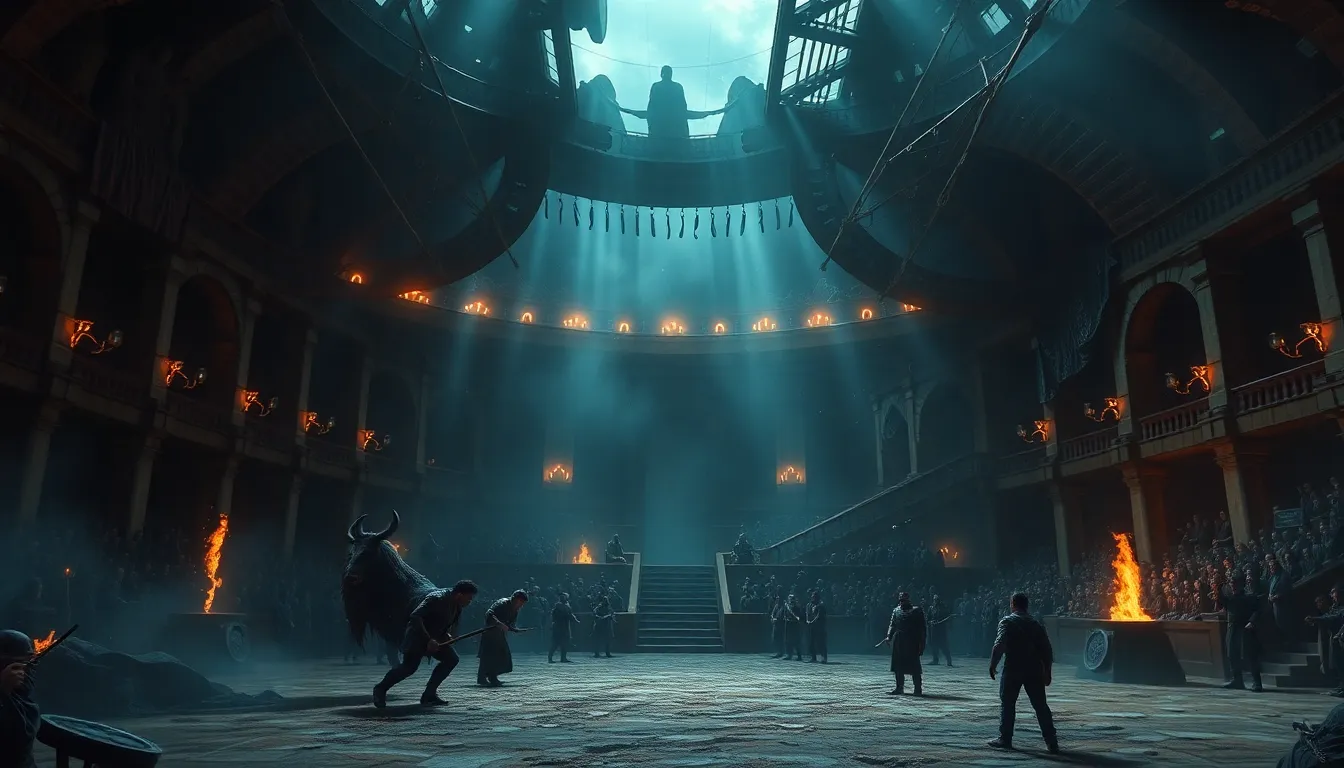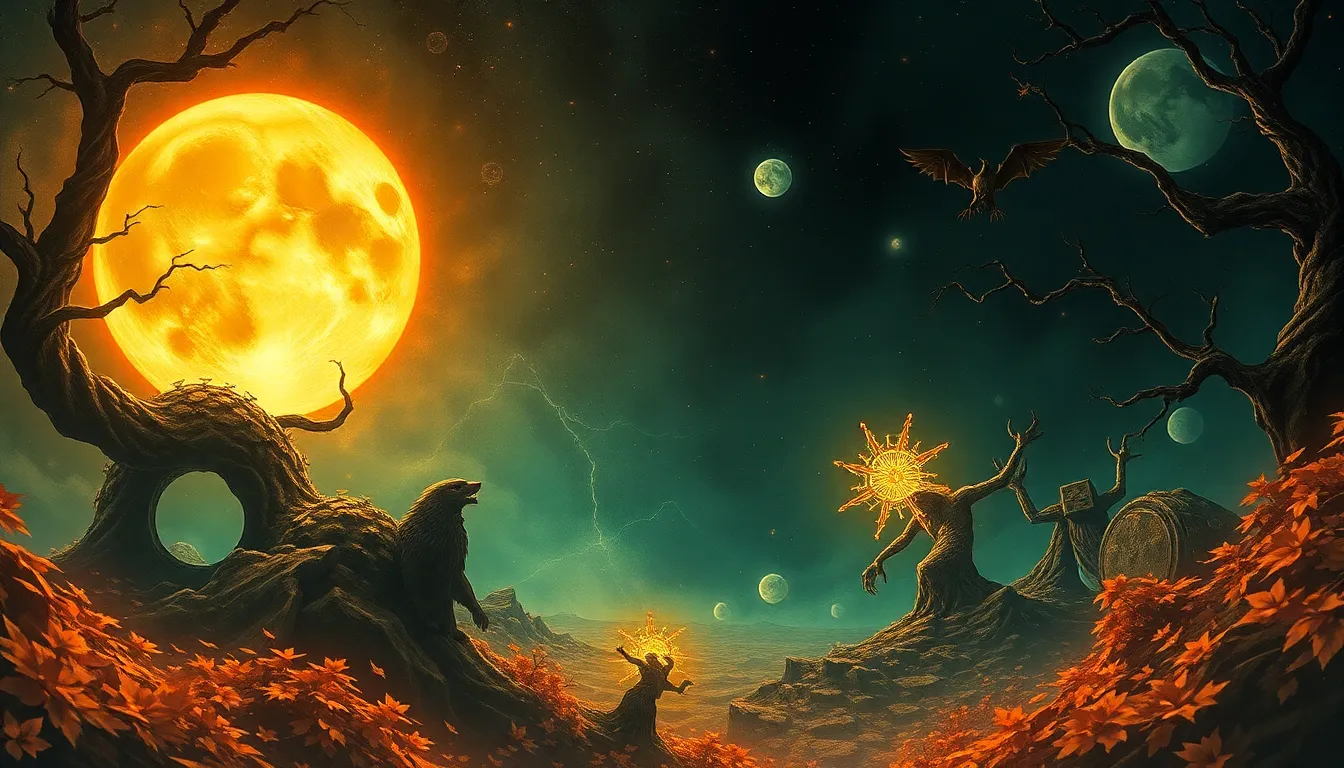The Legendary Arena: Unforgettable Mythological Showdowns!
I. Introduction to Mythology and Its Influence on Culture
Mythology refers to a collection of stories, beliefs, and traditions that are passed down through generations, often explaining the world around us, human behavior, and cultural practices. These narratives serve as a foundation for understanding history, morality, and the universe, influencing art, literature, and modern storytelling.
Mythological stories play a pivotal role in shaping cultural narratives, providing frameworks through which societies interpret their values, struggles, and triumphs. They often encapsulate fundamental human experiences, such as love, war, and the quest for knowledge.
Across various cultures, legendary arenas have emerged as significant settings for these narratives. These arenas symbolize not just physical spaces for conflict but also the emotional and spiritual battlegrounds where gods and heroes face their destinies.
II. The Concept of the Arena in Mythology
Arenas have historical significance in ancient cultures, often serving as venues for public spectacles, gladiatorial combat, and religious ceremonies. They represented the heart of community life and were sites where social hierarchies and cultural values were reinforced.
Symbolically, arenas in mythology represent battlegrounds for gods and heroes, places where fate and free will collide. These settings are often imbued with meaning, reflecting the struggles between good and evil, chaos and order.
- Colosseum: The iconic Roman amphitheater known for gladiatorial contests and public spectacles.
- Valhalla: In Norse mythology, the hall of the slain where warriors prepare for Ragnarok, the end of the world.
III. Iconic Mythological Figures and Their Rivalries
Key mythological figures such as Zeus, Thor, and Odin have become symbols of power and authority in their respective mythologies. Their stories are often characterized by epic rivalries that define their narratives and shape the world around them.
Famous rivalries include:
- Zeus vs. Cronus: The overthrow of the Titan Cronus by his son Zeus, marking the rise of the Olympian gods.
- Thor vs. Jörmungandr: The battle between Thor and the Midgard Serpent, a pivotal event in Norse mythology.
- Odin vs. Fenrir: The struggle between Odin and the monstrous wolf Fenrir during Ragnarok.
These rivalries impact their respective mythologies by establishing themes of sacrifice, strength, and the quest for justice, resonating with audiences throughout time.
IV. Legendary Showdowns: Key Battles in Mythology
Some of the most notable battles in mythology include:
- Hercules vs. Hydra: Hercules’ labor of slaying the multi-headed serpent symbolizes the struggle against overwhelming odds.
- Achilles vs. Hector: The duel between Achilles and Hector in the Trojan War epitomizes themes of honor and revenge.
The thematic significance of each showdown often reflects deeper moral lessons and societal values. For instance, Hercules’ victory over the Hydra illustrates perseverance, while Achilles’ conflict with Hector raises questions about fate and mortality.
The consequences of these battles extend beyond the immediate narrative, influencing cultural perceptions of heroism and the complexities of human nature.
V. The Role of Fate and Destiny in Mythological Conflicts
Fate is a recurring theme in mythology, often depicted as an inescapable force that shapes the lives of gods and mortals alike. This concept influences the outcomes of legendary showdowns, highlighting the tension between free will and destiny.
Notable examples of fate in action include:
- The Trojan War: The prophesied downfall of Troy serves as a backdrop for the tragic events of the war, showcasing how fate dictates the lives of its heroes.
- Oedipus Rex: The story of Oedipus illustrates how attempts to escape fate can lead to devastating consequences.
These narratives serve to remind audiences of the complexities of life, where choices and destiny intertwine, often leading to unforeseen outcomes.
VI. The Influence of Mythological Showdowns on Modern Storytelling
Ancient myths continue to inspire contemporary literature and film, demonstrating the enduring appeal of mythological conflicts. Many modern stories draw from these legendary narratives, reinterpreting them for new audiences.
The themes of heroism, sacrifice, and moral dilemmas resonate in popular culture, as seen in:
- Marvel’s Thor: A modern adaptation of Norse mythology, portraying the struggles of the god of thunder.
- Clash of the Titans: A retelling of the Greek myth of Perseus, featuring epic battles against mythical creatures.
These adaptations showcase how mythological elements can be reimagined, making them relevant to contemporary issues and values.
VII. The Evolution of Mythological Arenas in Popular Media
The portrayal of arenas in video games and films has evolved significantly, reflecting advancements in technology and storytelling techniques. Modern media allows for immersive experiences, bringing mythological battles to life in ways previously unimaginable.
The impact of technology on the representation of mythological battles includes:
- Enhanced visual effects that create realistic portrayals of epic confrontations.
- Interactive storytelling in video games that allows players to engage with mythological narratives directly.
Future trends in mythological storytelling may include more diverse representations and explorations of lesser-known myths, expanding the narrative possibilities within these legendary arenas.
VIII. The Symbolism of Good vs. Evil in Mythological Showdowns
Mythological narratives often explore moral dichotomies, presenting conflicts between good and evil. These themes resonate with audiences across cultures, providing frameworks for understanding human behavior and ethical dilemmas.
Examples of good vs. evil archetypes in legendary battles include:
- Zeus vs. Titans: The battle between the Olympians and Titans represents the triumph of order over chaos.
- St. George vs. the Dragon: A classic tale symbolizing the victory of good over evil.
These narratives encourage reflection on moral choices, prompting audiences to consider the nature of heroism and villainy in their own lives.
IX. Lessons Learned from Mythological Showdowns
Mythological showdowns convey moral and ethical lessons that transcend time and culture. They often highlight the importance of courage, sacrifice, and the struggle for justice, providing guidance for personal conduct and societal values.
Key lessons from these stories include:
- The value of perseverance in the face of adversity.
- The consequences of pride and hubris.
- The complexity of human relationships and the impact of choices.
Ultimately, the legendary arenas of mythology serve not only as battlegrounds for gods and heroes but also as platforms for exploring the human condition, imparting wisdom that remains relevant in today’s world.




